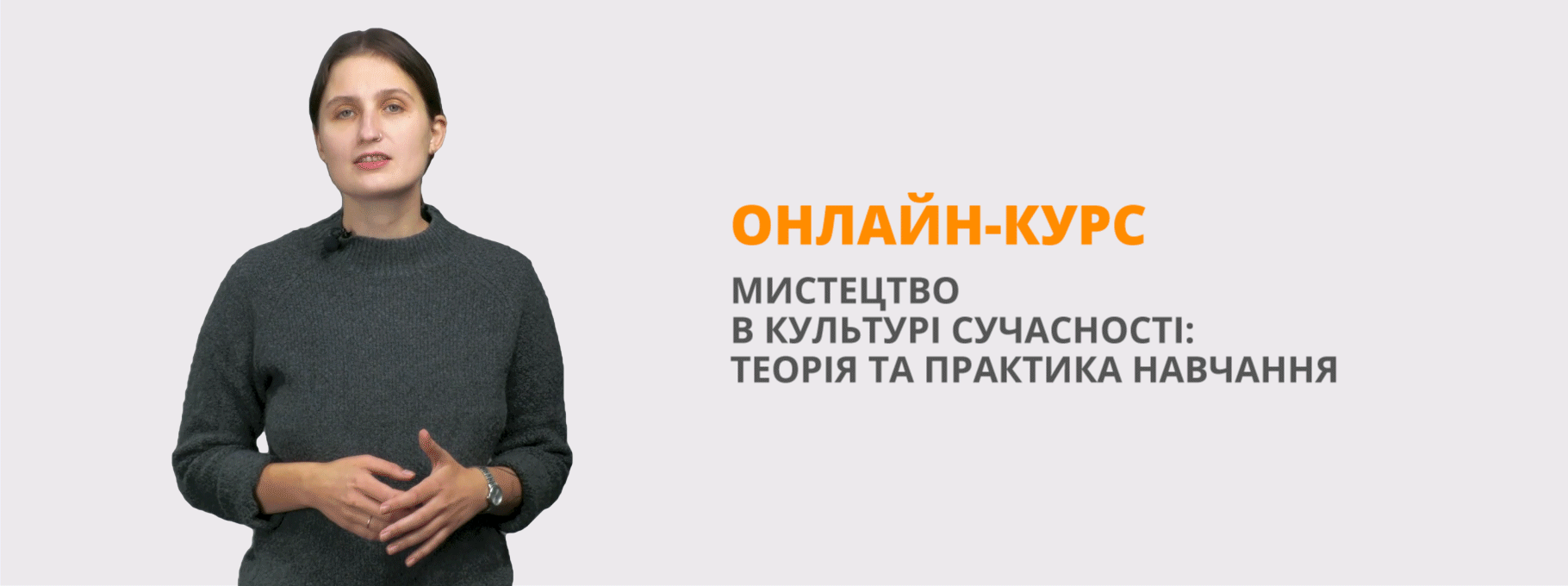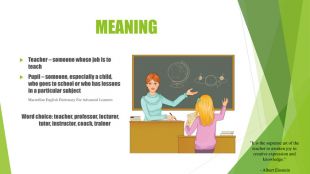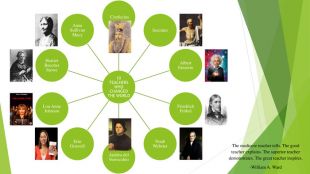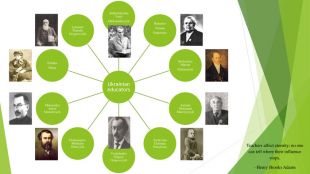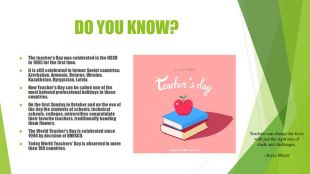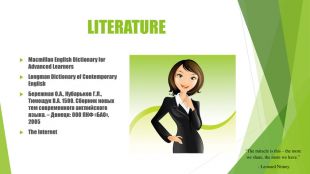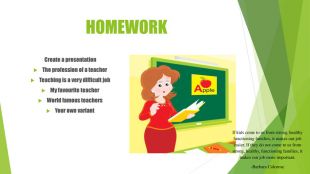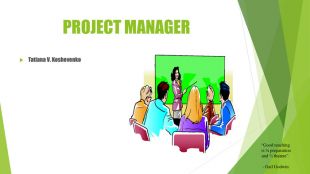In The World Of Professions. Teaching
Objectives: to learn more about this profession; to develop students' reading, listening, writing and communicative skills on the topic of the lesson; to practice students in research work
Theme: In The World Of Professions. Teaching
Objectives: to learn more about this profession; to develop students’ reading, listening, writing and communicative skills on the topic of the lesson; to practice students in research work.
The Conducting of the Lesson
- INTRODUCING
- Greeting and Aim
- Warm up
Teacher’s presentation
- THE MAIN PART OF THE LESSON
1. Reading
- Pre-reading activity
What does it mean to you a good teacher?
Is it difficult or easy to be a teacher in today’s world? Why? Why not?
- While-reading activity
Read the text and try to understand the main idea of the text.
- Post-reading activity
Look through the text. Ask and answer the questions.
2. Listening
- Pre-listening activity
Have you ever heard about famous Ukrainian teachers?
- While-listening activity
Listen to the texts and choose the right pictures.
- Post-listening activity
Discuss new information about famous Ukrainian teachers.
3. Writing
Read the task and fill in the crossword (or Task 3)
4. Communicative Activities
Think a little bit and draw a conclusion
- THE FINAL PART OF THE LESSON
- Home Assignment
Make a crossword about famous tеасhers;
Write a short story or a fairy-tale about teachers;
Create a presentation about your favourite teacher;
Your own variant;
Profession of a teacher
Some people think that the profession of a teacher is important and noble, while othersclaim it has lost its positions and it is not as respected as it used to be.
A teacher is a person who plays a very important role in children's development,upbringing and education.
One should have some particular traits of character to be a success in this profession.
I strongly feel that the profession of a teacher is one of the most important professions in the world.
A teacher is always responsible for his or her pupils.
He or she shouldencourage their inner development, protect them from any negative influence andwatch their progress carefully.
A teacher's responsibility is not only to educate a child.
He or she should also understand pupils' feelings and dreams, share their problems andgive good advice.
A real teacher is a person who can inspire his pupils with interest andlove for his
or her subject.
What is more, a teacher may even become as important for children as their parents.
However, some people believe that nowadays teachers are not as respected as they used to be.
Unfortunately, this noble profession is not well paid and it makes some people think that it is not prestigious.
Modern society respects money and power.
Thatis why young people try to choose professions which can make them rich and
influential.
Everybody is eager to make a career and to become famous and successful.
But good teachers do not strive for money or fame.
Their only concern is children's welfare.
To conclude, we should have the greatest respect for teachers.
They are deeply devotedto their job in spite of all problems and difficulties.
We should be grateful to ourteachers for their help, patience and professionalism.
Task 1- Read the text and try to understand the main idea of the text
Teaching is a very difficult job of great responsibility and most specific character. There is a wide variety of work in teaching. A good teacher is not only a communicator of knowledge but a model of competence. He forms attitudes to his subject and attitudes to learning, becoming himself a symbol of education process, a person who is learning as well as teaching. While communicating with children a teacher studies them closely to discover their interests, their strengths and weaknesses, their needs and abilities. Thus a good teacher always regards capacities his pupils have, trying to temper his teaching methods to children’s abilities and aptitudes. He builds his work upon what he learns about his children.
An environment should be created to stimulate children to develop their abilities and satisfy their interests. “Climate” of a classroom depends on the nature of personal relationships between a teacher and his pupils. These relationships should be founded on respect for a person. Thus a primary condition of creating a good atmosphere in class is that everybody in it respects everybody in it. Teacher’s authority will be ensured by respect of his pupils, because his knowledge and skill are greater and better coordinated and his thinking is at a higher level than that of his pupils. His commands are likely to be respected and obeyed then.
It is a purpose of education to liquidate ignorance. But it is also the function of education to help children to live in the community, to prepare them for real life situations. Social development is paid just as much attention to as intellectual development. School becomes a place of work and play, of living and learning. A teacher takes an active part in shaping of a child’s character, fostering honesty, kindness, loyalty, cooperation and respect for ideals.
Quintilian, the prominent Roman school master, wrote in his work published about 95 AD the following about a teacher and his work: “Let him adopt a parental attitude to his pupils. Let him be free from vice himself. Let him be strict but not austere, kind but not too familiar: for austerity will make him unpopular while familiarity breeds contempt. He must control his temper without shutting his eyes to faults requiring correction. His instruction must be free from affection, his industry great, his demands on class continuous, but not extravagant. He must be ready to answer questions and to put them unasked to those who sit silent. In praising the answers of his pupils he must be neither grudging nor over-generous. In correcting faults he must avoid sarcasm and above all abuse to discourage industry.”
Vasily Sukhomlinsky: The teacher who changed the world
In the aftermath of World War Two Vasily Sukhomlinsky, a young Ukrainian teacher, set out to develop a holistic educational practice that would address all the needs of his students, many of whom had lived through the atrocities of the war. As Dr Alan Cockerill writes, his legacy is still being honoured and practiced to this day.
Vasily Sukhomlinsky is known in many parts of the world as the creator of the "School of Joy", a preschool program that was conducted almost totally outdoors and addressed all the needs of growing children: physical, emotional, intellectual and spiritual.
Sukhomlinsky sought to engage his students at the levels of heart, head and hands.
Sukhomlinsky's books and articles, which cover almost every aspect of school education, have been read by millions of teachers in Ukraine, Russia and China. They are full of optimism — though his life experiences could easily have made him a broken and bitter man.
His life was full of hardship, and during his final years he endured attacks from Soviet ideologues who had little comprehension of his holistic approach to education.
Sukhomlinsky was born in 1918 in central Ukraine, in the midst of a civil war. As a young teenager he lived through a famine that killed millions of Ukrainians, including at least one of his close friends.
Then, when the Soviet Union was invaded in 1941, Sukhomlinsky, a young school teacher, was called up to fight.
He almost died on the battlefield — his arm was nearly severed, and he carried shrapnel in his chest for the remainder of his relatively short life.
Unfit for further military service, he worked as a school principal in the Urals until his homeland was freed from German occupation in 1944.
At that time, letters arrived from his relatives, informing him that his father was dead, and that his young wife and their baby had been killed by a Gestapo officer.
When Sukhomlinsky learnt of the circumstances of his wife's death his mind was in turmoil — he could not fathom how anyone born of a mother could commit such atrocities.
Such experiences could easily have turned him into a despairing human being, but from Sukhomlinsky's anguish was born a burning commitment to develop an educational method that would cultivate genuine humanity, and make inhumane behaviour abhorrent.
Sukhomlinsky came to believe that he was living at the dawn of an "Age of Humanity", and that in the future people would not know what it was for one human being to strike another.
While this may sound like a pipe dream, Sukhomlinsky was remarkably successful in bringing his dreams to life within his own school.
The school in Pavlysh
Sukhomlinsky remarried and raised two children. From 1948 until his death in 1970 he was principal of a combined primary and secondary school in the village of Pavlysh, not far from where he was born.
He was extremely self-disciplined, with an astonishing capacity for work. As a principal he led by example, taking responsibility for a preschool group, teaching his own subject of Ukrainian language and literature, and mentoring young teachers — visiting their lessons and inviting them to his.
He maintained close relations with parents, many of whom were former students, and ran lectures on parenting twice per month, addressing children's developmental needs at various ages from preschool to senior high school.
From 4-8am each day he wrote about his experience, producing more than 500 articles and 30 books, many of which were published posthumously. Thousands of teachers visited his school and wrote glowing tributes to what they witnessed there.
Like other holistic educators, Sukhomlinsky sought to engage his students at the levels of heart, head and hands.
All of Sukhomlinsky's work addresses deep questions about what it means to be human — emotionally, in our relationships with others; intellectually, in our exploration of the universe; and vocationally, in our efforts to serve humanity and leave a trace upon the earth.
His writings are all based on his own experience, and contain vivid descriptions of his interactions with students. They have been translated into many languages and have inspired generations of educators around the world, especially in Ukraine, Russia and China, but this influence has been hard won.
Attacks in the Press
Some of Sukhomlinsky's approaches ran counter to mainstream trends in Soviet education.
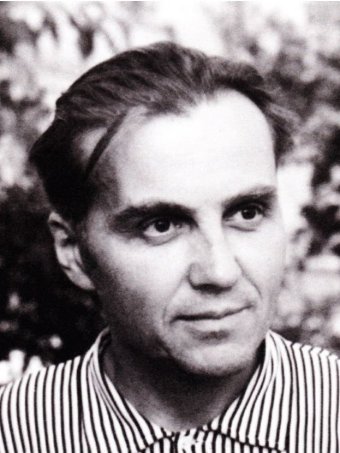 IMAGE: SUKHOMLINSKY RECEIVED A GREAT DEAL OF CRITICISM FOR HIS TEACHING METHODS, AFTER THE OUSTING OF NIKITA KHRUSHCHEV AS LEADER OF THE COMMUNIST PARTY IN THE LATE 1960S. (SUPPLIED: ALAN COCKERILL)
IMAGE: SUKHOMLINSKY RECEIVED A GREAT DEAL OF CRITICISM FOR HIS TEACHING METHODS, AFTER THE OUSTING OF NIKITA KHRUSHCHEV AS LEADER OF THE COMMUNIST PARTY IN THE LATE 1960S. (SUPPLIED: ALAN COCKERILL)
Another leading Soviet educator, Anton Makarenko, who had worked very effectively with colonies of homeless youth during the 1920s and 30s, had advocated harsh discipline, with the needs of the individual considered inferior to those of the collective.
Sukhomlinsky advocated an approach in which the collective fostered the growth of each individual, and he emphasised the need to educate empathy from an early age.
"How important this is to teach small children to recognise, from the eyes, movements and speech of the people around them, grief and joy, disappointment and concern, anxiety and confusion," Sukhomlinsky wrote.
"If we do not carry out this work a person may grow up to be an insensitive blockhead. Collect 30 such blockheads together and you will have a 'collective', but what sort? It will be a blind, soulless force, prepared to trample an individual into the ground."
Despite the popularity of Sukhomlinsky's writings with practising teachers, they attracted criticism from some quarters, especially after the ousting of Nikita Khrushchev as leader of the Communist Party.
Khrushchev had been responsible for the denunciation of Stalin, and had ushered in a period of relative liberalisation known as "The Thaw". Under Khruschev, who was himself Ukrainian, Sukhomlinsky's work thrived.
When Khrushchev was replaced by Leonid Brezhnev there was a period of relative tightening of ideological control, and from 1967 Sukhomlinsky was subjected to a number of attacks in the press, accusing him, amongst other things, of "abstract humanism" (as opposed to "socialist humanism").
Remembering Sukhomlinsky
From 1967 Sukhomlinsky found it more difficult to publish his work, and there was a decline in his health. The fragments of metal that remained in his chest from the war had travelled to his heart, and some were unable to be safely removed by surgery.
Sukhomlinsky knew he did not have long to live, and set about recording his experience and ideas for posterity, writing several of his most enduring works.
He died in September 1970, at the beginning of the school year.
The whole village gathered for his funeral, with a procession led by the grade one students Sukhomlinsky had worked with during the previous year.
"That is not our teacher," said one of the little children.
"Our teacher always walked or sat, and that one is lying down ... Our teacher promised he would take us out in a boat."
Sukhomlinsky had encouraged his students to grow flowers, and the route from the clubhouse to the cemetery was strewn with dahlias and asters.
After his death many educators spoke up in support of Sukhomlinsky, and previously unpublished works continued to appear for many years, giving the impression that he was still alive — new publications continue to appear even today.
Dr Alan Cockerill is an Australian school teacher and an adjunct research fellow at Monash University. His book about Sukhomlinsky, Each One Must Shine, was published in 1999.
10 Teachers Who Changed The World
There isn’t a person among us who hasn’t had their lives touched by a particular teacher. Teachers inspire us and help us realize our full potential. They help us to reach our goals, whether these goals are personal, professional or academic. Throughout history, teachers have improved our quality of lives through education and have done so without the need for praise or personal recognition. It is their dedication and hard work that improved the lives of their students and enriched the community in which they lived and worked.
Of course, some teachers have a greater impact on society than others. There are teachers who have stamped their mark on civilization as a whole and has dramatically changed the course of history. Today, we are going to be discussing 10 teachers who changed not only their local communities and the lives of their students, but the whole world as well.
1. Confucius
Confucius was a Chinese thinker who lived during the fifth century BCE and developed Confucianism. Confucianism is a complex system of moral, philosophical, social and political thought that had a dramatic influence on Asian culture. This philosophical system requires that individuals focus on moral development and personal cultivation. It’s influence can be seen in many Eastern Asian countries who continue to make laws based upon the system’s main concepts of moral cultivation.
2. Socrates
Socrates is Greek philosopher who is acknowledged by scientists and educators all over the world as being one of the most enlightened teachers in history. He is also credited as being the father of Western philosophy and developed the theory of negative hypothesis elimination known as the Socratic Method. This theory helped to cultivate critical thinking in the West and its influence can be felt in the fields of law, psychotherapy and even human resource training.
3. Albert Einstein
Albert Einstein was a theoretical physicist, teacher and author who is best known for his contributions to the field of general relativity and special relativity. He is also known for his theories on post-Newtonian expansion, unified field theory, principle of equivalence and theory of critical opalescence. These theories expanded physics in ways that are still being felt to this very day.
4. Friedrich Fröbel
Friedrich Fröbel was a German teacher who laid the foundation for the modern educational system. He was the first to theorize that education should shape itself to the particular needs and capabilities of children. He also developed the idea of kindergarten and coined the phrase in both German and English.
5. Noah Webster
Noah Webster was an American teacher who was an editor, lexicographer, author and spelling reformer. He is often referred to as the ‘Father of American Education” and his speller books were responsible for teaching four generations of American children how to read and spell. He is also known for his efforts to take religion out of the classroom and make it more secular.
6. Andrea del Verrocchio
Andrea del Verrocchio was a fifteenth century sculptor and painter who taught at the court of Lorenzo de’ Medici in Florence. Though he was a great painter in his own right, he is best known for teaching some of the greatest painters of all time including Leonardo da Vinci, Michelangelo, Lorenzo di Credi and Pietro Perugino.
7. Erin Gruwell
Erin Gruwell is a teacher that began her career at Woodrow High School in Long Beach, California. Though her students came from tough inner-city neighborhoods and were often considered incorrigible, she was able to inspire them to embrace education and many of them would go on to become successful students in college. She also founded the Freedom Writers Foundation, an organization whose primary purpose is to inspire underprivileged students.
8. Lou Anne Johnson
Lou Anne Johnson, best known for her character played by Michelle Pfeiffer in the movie Dangerous Minds, is a teacher who worked to encourage the academic efforts of underprivileged children. She has written several books and continues to work with underprivileged students all over the country.
9. Harriet Beecher Stowe
Many people recognize Harriet Beecher Stowe as an American abolitionist and author who wrote “Uncle Tom’s Cabin”, a book that is commonly believed to be directly responsible for starting the Civil War. However, before she wrote this landmark book she was a teacher who founded a school in Ohio and taught her students the virtues of tolerance and equality.
10. Anne Sullivan Macy
Anne Sullivan Macy, known popularly as simply Annie Sullivan, was the teacher and lifelong companion of Helen Keller. She is well respected for her teaching methods that allowed Keller to progress to her full potential. She was also recognized by Temple University for her tireless commitment to Helen Keller’s education. Annie Sullivan would go on to become on of the central characters in Keller’s book “The Story of Me”, which was made into the popular play and movie entitled “The Miracle Worker.”
|
1.
Someone who owns or works in a shop that sells flowers and indoor plants for the home |
2.
Someone who studies the way in which money and goods are produced and used and the systems of business and trade |
3.
Someone who works at nursery school with children aged two to six |
|
4.
Someone who shows people to their seats at a theatre, cinema, wedding etc. |
5.
Someone whose job is to cut men’s hair and sometimes to shave them |
6.
Someone whose job is to advise people about laws, write formal agreements, or represent people in court |
|
7.
Someone whose job is to study of the rocks, soil etc. that make up the Earth |
8.
Someone whose job is to welcome and deal with people arriving in a hotel or office building, visiting a doctor |
9.
Someone who writes news reports for newspapers, magazines, television, or radio |
|
10.
Someone who drives a large road vehicle used to carry goods |
11.
Someone who studies societies and the behavior of people in groups |
12.
Someone whose job is to drive a car for someone else |
|
13.
Someone who changes spoken words from one language into another, especially as their job |
14.
Someone who cuts, washes, and arranges people’s hair in particular styles |
15.
Someone who studies animals and their behaviour |
|
16.
Someone who is in a position of authority in the army, navy etc. |
17.
Someone who paints pictures; Someone whose job is painting houses or other buildings |
18.
Someone who plays a musical instrument, especially very well or as a job |
|
19.
Someone who makes their own clothes, or makes clothes for other people |
20.
Someone who serves food and drink at the tables in a restaurant |
21.
Someone who performs in a play or film |
|
22.
Someone who treats sick animals |
23.
Someone whose job is to look after people who are ill or injured, usually in the hospital |
|
|
|
|
|
|
|
|
|
|
|
|
|
|
|
|
|
|
|
|
|
|
|
|
|
|
|
|
|
|
|
|
|
|
|
|
03 |
|
|
|
|
|
|
|
|
|
|
|
|
|
|
|
|
|
|
|
|
|
|
|
|
|
|
|
|
|
K |
|
|
|
|
|
|
|
|
|
|
|
|
|
|
|
|
|
|
|
|
|
|
|
|
|
|
|
|
|
I |
|
|
|
|
|
|
|
|
|
|
|
|
|
|
|
|
|
|
|
|
|
|
|
|
|
|
|
|
|
N |
|
|
|
|
|
|
09 |
10 |
|
|
|
|
|
|
|
|
|
|
|
|
|
22 |
|
|
|
|
|
|
|
D |
|
|
|
|
|
|
J |
T |
|
|
|
|
13 |
14 |
|
|
17 |
|
|
|
|
V |
|
|
|
|
01 |
|
|
E |
|
05 |
|
|
|
|
O |
R |
|
|
12 |
|
I |
H |
|
|
P |
|
19 |
|
|
E |
|
|
|
|
F |
02 |
|
R |
|
B |
|
|
|
|
U |
U |
|
|
C |
|
N |
A |
|
|
A |
|
D |
|
21 |
T |
23 |
|
|
|
L |
E |
|
G |
04 |
A |
|
06 |
07 |
|
R |
C |
|
|
H |
|
T |
I |
15 |
16 |
I |
18 |
R |
20 |
A |
E |
N |
|
|
|
O |
C |
|
A |
U |
R |
|
L |
G |
|
N |
K |
|
11 |
A |
|
E |
R |
Z |
O |
N |
M |
E |
W |
C |
R |
U |
|
|
|
R |
O |
|
R |
S |
B |
|
A |
E |
08 |
A |
|
|
S |
U |
|
R |
D |
O |
F |
T |
U |
S |
A |
T |
I |
R |
|
|
|
I |
N |
|
T |
H |
E |
|
W |
O |
R |
L |
D |
|
O |
F |
|
P |
R |
O |
F |
E |
S |
S |
I |
O |
N |
S |
|
|
|
S |
O |
|
E |
E |
R |
|
Y |
L |
E |
I |
R |
|
C |
F |
|
R |
E |
L |
I |
R |
I |
M |
T |
R |
A |
E |
|
|
|
T |
M |
|
N |
R |
|
|
E |
O |
C |
S |
I |
|
I |
E |
|
E |
S |
O |
C |
|
C |
A |
E |
|
R |
|
|
|
|
|
I |
|
E |
|
|
|
R |
G |
E |
T |
V |
|
O |
U |
|
T |
S |
G |
E |
|
I |
K |
R |
|
Y |
|
|
|
|
|
S |
|
R |
|
|
|
|
I |
P |
|
E |
|
L |
R |
|
E |
E |
I |
R |
|
A |
E |
|
|
|
|
|
|
|
|
T |
|
|
|
|
|
|
S |
T |
|
R |
|
O |
|
|
R |
R |
S |
|
|
N |
R |
|
|
|
|
|
|
|
|
|
|
|
|
|
|
|
T |
I |
|
|
|
G |
|
|
|
|
T |
|
|
|
|
|
|
|
|
|
|
|
|
|
|
|
|
|
|
|
|
O |
|
|
|
I |
|
|
|
|
|
|
|
|
|
|
|
|
|
|
|
|
|
|
|
|
|
|
|
|
|
N |
|
|
|
S |
|
|
|
|
|
|
|
|
|
|
|
|
|
|
|
|
|
|
|
|
|
|
|
|
|
I |
|
|
|
T |
|
|
|
|
|
|
|
|
|
|
|
|
|
|
|
|
|
|
|
|
|
|
|
|
|
S |
|
|
|
|
|
|
|
|
|
|
|
|
|
|
|
|
|
|
|
|
|
|
|
|
|
|
|
|
|
T |
|
|
|
|
|
|
|
|
|
|
|
|
|
|
|
|
|
|
|
|
|
|
|
|
|
|
|
|
|
|
|
|
|
|
|
|
|
|
|
|
|
|
|
|
|
|
|
|
|
|
|
|
|
|
|
|
|
|
|
|
|
|
|
|
|
|
|
|
|
|
|
|
|
|
|
|
|
|
|
|
|
|
|
03 |
|
|
|
|
|
|
|
|
|
|
|
|
|
|
|
|
|
|
|
|
|
|
|
|
|
|
|
|
|
* |
|
|
|
|
|
|
|
|
|
|
|
|
|
|
|
|
|
|
|
|
|
|
|
|
|
|
|
|
|
* |
|
|
|
|
|
|
|
|
|
|
|
|
|
|
|
|
|
|
|
|
|
|
|
|
|
|
|
|
|
* |
|
|
|
|
|
|
09 |
10 |
|
|
|
|
|
|
|
|
|
|
|
|
|
22 |
|
|
|
|
|
|
|
* |
|
|
|
|
|
|
* |
* |
|
|
|
|
13 |
14 |
|
|
17 |
|
|
|
|
* |
|
|
|
|
01 |
|
|
* |
|
05 |
|
|
|
|
* |
* |
|
|
12 |
|
* |
* |
|
|
* |
|
19 |
|
|
* |
|
|
|
|
* |
02 |
|
* |
|
* |
|
|
|
|
* |
* |
|
|
* |
|
* |
* |
|
|
* |
|
* |
|
21 |
* |
23 |
|
|
|
* |
* |
|
* |
04 |
* |
|
06 |
07 |
|
* |
* |
|
|
* |
|
* |
* |
15 |
16 |
* |
18 |
* |
20 |
* |
* |
* |
|
|
|
* |
* |
|
* |
* |
* |
|
* |
* |
|
* |
* |
|
11 |
* |
|
* |
* |
* |
* |
* |
* |
* |
* |
* |
* |
* |
|
|
|
* |
* |
|
* |
* |
* |
|
* |
* |
08 |
* |
|
|
* |
* |
|
* |
* |
* |
* |
* |
* |
* |
* |
* |
* |
* |
|
|
|
I |
N |
|
T |
H |
E |
|
W |
O |
R |
L |
D |
|
O |
F |
|
P |
R |
O |
F |
E |
S |
S |
I |
O |
N |
S |
|
|
|
* |
* |
|
* |
* |
* |
|
* |
* |
* |
* |
* |
|
* |
* |
|
* |
* |
* |
* |
* |
* |
* |
* |
* |
* |
* |
|
|
|
* |
* |
|
* |
* |
|
|
* |
* |
* |
* |
* |
|
* |
* |
|
* |
* |
* |
* |
|
* |
* |
* |
|
* |
|
|
|
|
|
* |
|
* |
|
|
|
* |
* |
* |
* |
* |
|
* |
* |
|
* |
* |
* |
* |
|
* |
* |
* |
|
* |
|
|
|
|
|
* |
|
* |
|
|
|
|
* |
* |
|
* |
|
* |
* |
|
* |
* |
* |
* |
|
* |
* |
|
|
|
|
|
|
|
|
* |
|
|
|
|
|
|
* |
* |
|
* |
|
* |
|
|
* |
* |
* |
|
|
* |
* |
|
|
|
|
|
|
|
|
|
|
|
|
|
|
|
* |
* |
|
|
|
* |
|
|
|
|
* |
|
|
|
|
|
|
|
|
|
|
|
|
|
|
|
|
|
|
|
|
* |
|
|
|
* |
|
|
|
|
|
|
|
|
|
|
|
|
|
|
|
|
|
|
|
|
|
|
|
|
|
* |
|
|
|
* |
|
|
|
|
|
|
|
|
|
|
|
|
|
|
|
|
|
|
|
|
|
|
|
|
|
* |
|
|
|
* |
|
|
|
|
|
|
|
|
|
|
|
|
|
|
|
|
|
|
|
|
|
|
|
|
|
* |
|
|
|
|
|
|
|
|
|
|
|
|
|
|
|
|
|
|
|
|
|
|
|
|
|
|
|
|
|
* |
|
|
|
|
|
|
|
|
|
|
|
|
|
|
|
|
|
|
|
|
|
|
|
|
|
|
|
|
|
|
|
|
|
|
|
|
|
|
|
|
|
|
|
|
|
|
|
|
Task 3 – A-Z of jobs and professions
What does a word “professions” mean to you? Can you find more words for each letter?
|
Actor, Actress, Accountant, Architect |
Nurse |
|
Barber, Baker, Bank clerk, Bartender, Builder |
Office manager, Officer |
|
Car mechanic, Carpenter, Chauffeur, Chemist, Cook |
Painter, Pharmacist, Politician, Priest, Private detective |
|
Doctor, Dressmaker, Designer, DJ |
Q |
|
Economist, Editor, Electrician, |
Receptionist, Reporter, |
|
Fashion model, Firefighter, Florist, |
Sales manager, Scientist, Sociologist, Stewardess |
|
Geologist |
Teacher, Translator, Truck driver, TV presenter, Typist, |
|
Hairdresser |
U |
|
Interpreter |
Veterinary |
|
Janitor, Journalist, Judge |
Watchman, Waiter, Watchmaker, Welder |
|
K |
X |
|
Lawyer, Librarian |
Y |
|
Marketing manager, Miner, Musician |
Zoologist |
Task 3 – A-Z of jobs and professions
What does a word “professions” mean to you? Can you find more words for each letter?
|
A |
N |
|
B |
O |
|
C |
P |
|
D |
Q |
|
E |
R |
|
F |
S |
|
G |
T |
|
H |
U |
|
I |
V |
|
J |
W |
|
K |
X |
|
L |
Y |
|
M |
Z |
Task 1 – Teacher Mind Map
What comes to mind when you think of teacher’s profession?
Work in groups and write your ideas below.
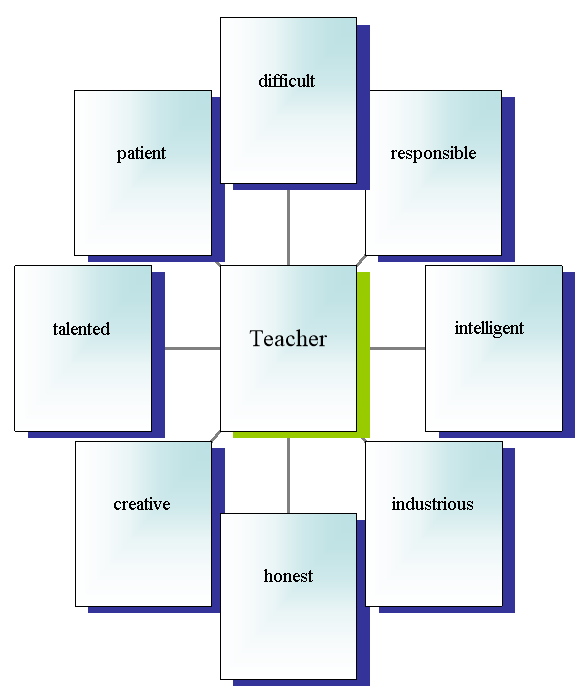
Task 1 – Teacher Mind Map
What comes to mind when you think of teacher’s profession?
Work in groups and write your ideas below.
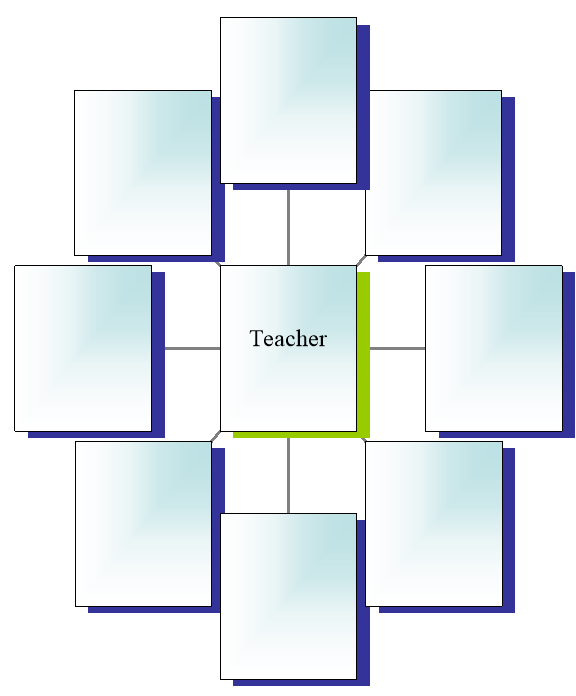


про публікацію авторської розробки
Додати розробку
